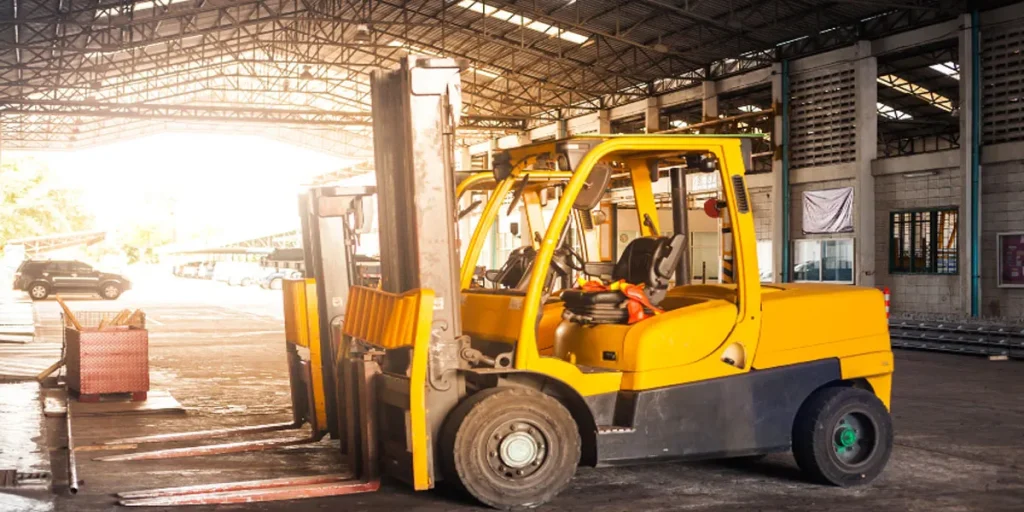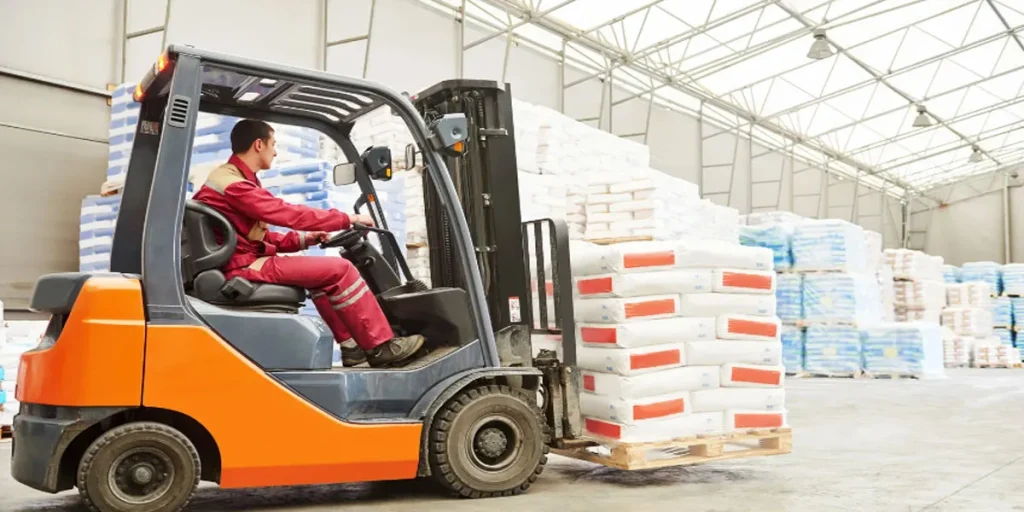A Toyota forklift’s weight can range between 5,000 and 50,000 pounds, depending on the model. The specific weight of a forklift is crucial for understanding its lifting capacity and operational use.
Delving into the world of material handling, the weight of a forklift is a key factor that affects not only the machine’s lifting capabilities but also its transportation and operational requirements.
Knowing the weight of a Toyota forklift is essential when considering floor loading constraints and the equipment necessary for transporting the forklift.
Toyota offers a diverse lineup of forklift models designed to meet varying needs, which is why the weight of their forklifts can vary considerably.
From compact electric models suitable for indoor use to robust, high-capacity internal combustion forklifts built for outdoor applications, each machine is constructed with precision, ensuring efficiency and safety.
With Toyota’s reputation for durability and reliability in the material handling industry, their forklifts are engineered to handle the demands of diverse environments while providing operators with a stable and secure lifting experience.
Anatomy Of Toyota Forklift Weight
When exploring the might and mechanics of Toyota forklifts, understanding their weight is crucial.
The weight impacts everything from transportation to operation. Let’s dive into the anatomy of Toyota forklift weight.
Different Models, Different Weights
Toyota forklifts come in various shapes and sizes. Each model designed to meet specific industrial needs. Below is a simplified breakdown of models and their typical weight range:
| Model Type | Weight Range |
|---|---|
| Electric Pallet Jacks | 450 lbs – 1,200 lbs |
| Electric Stackers | 2,800 lbs – 4,000 lbs |
| Reach Trucks | 5,500 lbs – 9,000 lbs |
| Internal Combustion Trucks | 7,000 lbs – 15,500 lbs |
Certain models can even weigh over 36,000 pounds!
Key Components Contributing To Weight
Several components are pivotal in contributing to the forklift’s overall weight. These key parts include:
- Power Source: The battery in electric models or the fuel tank in internal combustion forklifts.
- Mast: The lifting mechanism framework.
- Counterweight: Ensures stability when carrying heavy loads.
- Chassis: Body of the forklift that houses all components.
- Tires: Can be cushion or pneumatic, affecting weight and functionality.
These elements ensure the forklift operates smoothly and safely. They also account for the differences in weight between models.
Typical Weight Classifications

When exploring the diverse world of Toyota forklifts, understanding Typical Weight Classifications is crucial. Various tasks require different forklift sizes.
Weight classifications help to match the right forklift to the right job. Let’s dive into the common weight ranges and how they compare across different classes.
Identifying Common Weight Ranges
Toyota forklifts fit into distinct weight categories. Identifying these can ensure a safe and efficient choice for material handling needs.
From lightweight models ideal for small warehouses to heavy-duty equipment for large operations, knowing the weight range is key.
Toyota’s range often starts from around 3,000 pounds and can exceed 36,000 pounds for the largest models.
| Class | Typical Weight Range |
|---|---|
| Class I | 3,000 – 8,000 lbs |
| Class II | 3,000 – 5,000 lbs |
| Class III | Up to 8,000 lbs |
| Class IV & V | 8,000 – 36,000 lbs |
Comparisons Among Classes
Each Toyota forklift class not only has a different weight range but also features that suit various environments. For instance, Class I electric models are typically lighter.
In contrast, Class V internal combustion forklifts handle the heaviest loads. Below are some quick comparisons.
- Class I: Electric motor rider trucks, suitable for tight spaces.
- Class II: Electric motor narrow aisle trucks, perfect for high shelving.
- Class III: Hand trucks, ideal for quick and easy tasks.
- Class IV & V: Solid tires, designed for heavy-duty applications.
Factors Influencing Forklift Weight
Knowing the weight of a Toyota forklift is crucial for safety and operation. Several factors can affect a forklift’s weight.
These include materials, engine type, and extra features. We will explore these factors in detail.
Material And Build
The material used in forklift construction plays a key role in its weight. Toyota forklifts often use high-quality steel.
This ensures durability but also adds weight. The chassis, mast, and counterweight all contribute to the total weight.
For example, a standard Toyota counterbalance forklift may have a minimal design. But customization for specific tasks can change the weight significantly.
Engine Type And Add-ons
Different engine types impact forklift weight. Electric forklifts have battery packs that add considerable weight.
Internal combustion engines may seem lighter. But when you add the fuel tank, the difference can be minimal.
Add-ons and attachments also affect the weight. Here are some common items:
- Side shifters
- Forks
- Clamps
- Rotators
Each of these features serves a purpose but also adds to the overall mass.
| Add-On | Average Weight Increase |
|---|---|
| Side Shifter | 100 lb |
| Clamp | 400 lb |
It’s clear that the choice of material, engine type, and attachments can affect a forklift’s weight.
Impact Of Weight On Performance

Understanding a Toyota forklift’s weight is crucial. It influences how the forklift works. A heavier lift might handle more, but be harder to move.
A lighter one is the opposite. Performance depends on the right balance.
Load-carrying Capacity
The weight of a Toyota forklift sets its load-carrying limit. Heavy-duty forklifts have bigger engines and can lift more.
Lighter forklifts work well for smaller tasks. The weight of the forklift itself must support the load to ensure safety.
Here’s a basic idea of Toyota forklift weights and their capacities:
- Small Forklift: Weighs around 9,000 lbs, can lift up to 5,000 lbs.
- Medium Forklift: Weighs around, 20,000 lbs, can lift up to 10,000 lbs.
- Large Forklift: Can weigh more than 30,000 lbs with a capacity of over 20,000 lbs.
Maneuverability And Stability
A forklift’s weight impacts its ease of movement. Lighter forklifts can turn easily and work in tight spaces. Yet, they might not be as stable when lifting heavy loads.
| Forklift Type | Weight Class | Maneuverability |
|---|---|---|
| Electric | Lighter | High |
| Internal Combustion | Heavier | Lower |
Stability is key for safety. Toyota creates forklifts to be stable at all weights. A forklift with the right weight for the job will perform efficiently and safely.
Real-world Applications
Understanding how much a Toyota forklift weighs is crucial for safety and efficiency. In warehouses, construction sites, and docks, the right forklift makes all the difference.
Real-world applications show just how vital weight considerations are. From stability to load capacity, the forklift’s weight impacts every task it undertakes.
Choosing The Right Forklift For Your Needs
Key factors determine the best Toyota forklift for a job:
- Load Size: Heavier loads require sturdier forklifts.
- Navigation Space: Small spaces need lighter, more agile models.
- Floor Capacity: Some floors can only support a certain weight.
- Usage Frequency: More use may need a more durable, possibly heavier, forklift.
Check the forklift’s data plate for weight info to match your needs.
Case Studies: Weight In Action
| Model | Weight | Application | Outcome |
|---|---|---|---|
| Model 8FGU25 | 8,000 lbs | Warehouse | Optimal for heavy pallets |
| Model 8FBE15U | 2,650 lbs | Retail Backroom | Great for tight spaces |
| Model 8FDU30 | 9,260 lbs | Construction | Handles rough terrain |
Each case study highlights the weight’s role in performance. Lighter models navigate tight areas well.
Heavier forklifts manage unwieldy loads. Choose a weight that fits the task at hand for best results.
FAQ About the Weight of a Toyota Forklift
What Is The Average Weight Of A Toyota Forklift?
The average weight of a Toyota forklift can range from 4,000 to 11,000 pounds. This varies based on model, capacity, and attachments.
How Do Load Capacities Affect Toyota Forklift Weight?
Load capacities directly affect Toyota forklift weight; higher capacity forklifts are heavier due to more robust construction and counterweighting for stability.
Can Forklift Weights Vary By Model?
Yes, forklift weights do vary by model. Each Toyota model is designed for specific capacities and uses, influencing their weight.
Is The Toyota Forklift Weight Listed Online?
Toyota forklift weights are often listed online on official spec sheets or product pages. Dealerships also provide this information upon request.
Conclusion
Understanding the weight of a Toyota forklift is crucial for safe operation and informed purchasing. These versatile machines vary in weight, reflecting their model and capacity.
Remember to check specific model specifications for precise figures. Investing in the right forklift ensures efficiency and safety in your material handling tasks.
Choose wisely, stay informed!
